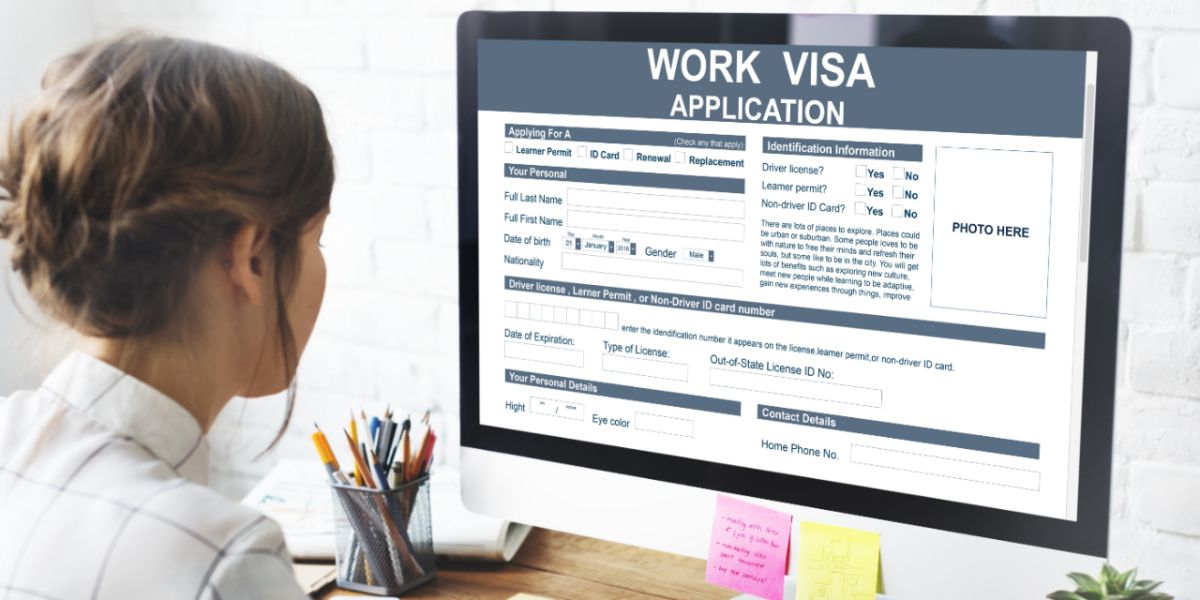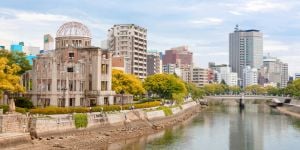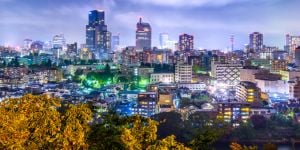
Working in Japan is a dream for many. Yet it is believed that finding a job in Japan and getting a work visa in the Land of the Rising Sun is quite challenging. The application process can be long and tedious, especially since the pandemic because the country closed its borders to fight the health crisis. Since 2022, Japan has gradually started to reopen. In addition, addressing its severe labor shortage in a competitive world after the pandemic, Japan has also unveiled new immigration pathways and changes in visa application procedures.

Japan's full recovery in arrivals after COVID-19
Due to the border closure, many foreigners had their visa applications canceled. Thousands of international students have been forced to give up on their dream of studying in Japan despite their eligibility certificate or to opt for an online solution, which was not always adequate (courses according to Japanese time, with a significant time gap sometimes, as for European countries). It was the same headache for workers and trainees whose employment offers had been withdrawn.
From March 1, 2022, students and professionals have been able to enter the country. For them, it is the end of a long and challenging journey or at least the beginning of an improvement. From June 2022, Japan eased the tourism restrictions by authorizing the arrival of tourist groups with a visa, dropping pre-arrival PCR tests, and allowing entry of visa-free independent tourists. Short-term stay for tourism, of course, is strictly forbidden to work.
After April 29, 2023, Japan lifted all border measures to prevent the spread of COVID-19. Since then, the number of foreign visitors for business and leisure has risen significantly. The Japan National Tourism Organization (JNTO) data showed that Japan's visitors reached 2.52 million in October, exceeding the pre-COVID levels. It offers a full recovery in arrivals for the first time after the relaxation of border controls last year.
Since January 1, 2024, Japan has ended the handling to prevent the spread of the new coronavirus infection. We expect to see more job opportunities as a result in the year to come.
Different types of professional visas in Japan
You can work in Japan with four main types of visas: highly-skilled professional visas for exceptional human resources, working visas (including various job titles), general visas like the student visa or the spouse visa, and specified visas like paid internship or working holiday visa (WHV). These visas are intended for long stays of more than 90 days.
Highly skilled professional visas
- Highly skilled professional (i) (a)/(b)/(c):
Created in 2012, as the name suggests, this visa concerns highly qualified experts. It was introduced by the government to attract foreign talent and to become more competitive on the international scene. While Canada and the United States have long been known for their international talent recruitment programs, Japan is still considered a confidential destination. With this visa, the country targets the elite. It is reserved for three job categories:
- Academic research at the expert level (and thus, different from the researcher or teacher visa);
- Rare technical expertise, specialization in a particular field (more advanced knowledge than required for the engineer visa);
- Management and leadership expert, business manager, finance expert, advanced knowledge of the corporate world, international market (more advanced expertise than required for the investor visa).
A highly qualified professional visa is the most advantageous. Unlike the other visas, it is valid for five years, usually limited to one or three years. The Highly Skilled Professional Visa gives access to permanent residence within 1 to 3 years, and the immigration procedure is faster than that of other visas. Family reunification is also allowed, and unlike other general visas, it is also possible to carry out other professional activities in addition to the one mentioned on the work permit.
Therefore, this visa has many advantages, but only a few applicants because of its numerous requirements, which make it very restrictive and difficult to obtain.
- Special Highly skilled professional or J-Skip:
Introduced in April 2023, this type of work visa is for those with a specific educational background, work history, and annual income. This system aims to attract researchers and professionals who meet specific criteria, like possessing a master's degree or higher and earning a yearly income exceeding 20 million yen.
Alternatively, those with over ten years of work experience and an income above the same threshold can apply. On the other hand, business operators must have at least five years of work experience and earn an annual income of over 40 million yen.
Once living in Japan for a year under the J-Skip visa, holders can apply for permanent residency. Additionally, they can increase the number of foreign domestic helpers employed from one to two, previously only possible under the Highly Skilled Professional visa. Moreover, spouses of J-Skip visa holders can apply for full-time employment in Japan, although there may be certain restrictions on the nature of the work they can engage in.
There are three categories of residence status for "J-Skip", depending on the activities carried out by the foreigner in Japan, which is similar to the general Highly Skilled Professional visa:
- "Highly academic research activities" include research, research instruction, or education under a Japanese public or private institution contract (examples: university professors and researchers);
- "Highly professional/technical activities" involve activities based on contracts with Japanese public or private corporate bodies, law firms, etc., that require natural science or humanities knowledge or technology;
- "Highly business managerial activities" include running or managing a business in a public or private corporate institution in Japan (for example: a company manager engaged in global business development).
For individuals falling under categories (1) and (2), the conditions for obtaining a "J-Skip" visa are as follows:
- Possess a Master's degree or higher and have an income of at least 20 million yen in Japan;
- Have more than ten years of work experience related to the business they will be conducting in Japan, with an annual income of 20 million yen or more in Japan.
For individuals belonging to category (3) as managers, the conditions are as follows:
- Have at least five years of experience in business management with an annual income of 40 million yen or more in Japan.
Specified Skilled Worker Visas (SSW): A highly controversial visa
Introduced in 2019, these visas are supposed to address the labor shortage in Japan. The Japanese government has plans to bring in 500,000 employees by 2025.
Specified Skilled Worker residence status was established to provide foreign nationals with more excellent employment prospects in Japan. This status is divided into type (i) and type (ii). Notably, type (ii) requires more specialized skills than type (i). In addition, type (i) is limited to 5 years, is non-renewable, and does not allow family reunification. Type (ii) is renewable and provides family reunification.
In August 2023, the Specified Skilled Worker (ii) program underwent an expansion, introducing nine new fields:
- Automobile Repair and Maintenance Industry;
- Aviation Industry;
- Accommodation Industry;
- Agriculture Industry;
- Building Cleaning Management;
- Fishery and Aquaculture Industries;
- Food and Beverage Manufacturing Industries;
- Food Service Industry;
- Machine parts and tooling/ Industrial machinery/ Electric, electronics and information industries.
Additionally, all work categories within the Shipbuilding and Ship Machinery Field, except for welding, were also incorporated into the program.
The Specified Skilled Worker Visa is intended for specific sectors under pressure, like nursing, personal assistance, agriculture, construction, maintenance, and the food industry, but these new visas are somewhat controversial. Critics fear the exploitation of workers with more precarious status than others. Foreigners with these visas are cheap labor for sometimes unscrupulous companies. Scandals have already broken out, implicating company managers who did not respect labor laws. Foreigners are more likely to be exploited without resources and speak poor Japanese.
The student visa for Japan
You can take advantage of your studies in Japan to work within the limit of 28 hours per week. It is strictly forbidden to work in the nightlife sector, however. Many students opt for a part-time job (baito), a small job in mini-markets or restaurants, for example. It is a good way to learn Japanese while discovering the Japanese labor market.
You can also use your studies to follow business programs, preparing you for your future career in Japan. In this case, your school can connect you with partner companies. The latter could sponsor you at the end of your studies. This is an ideal way to start your career in Japan, but of course, you can always look for a company to hire you.
The Internship Visa for Japan
In this particular case, everything will depend on the details of your internship. Will you be paid or unpaid? What will be the duration of your stay? Is it an academic exchange organized between your institution and your sponsor in Japan? If the request comes from your university, it will establish a tripartite internship agreement, linking the university, the Japanese employer, and you.
The Working Holiday Visa for Japan
The Working Holiday Visa (WHV) is granted to young people aged between 18 and 30, allowing them to live and work in Japan for one year. The Japanese WHV is only available to nationals of countries that have signed the WHV agreement with Japan. That includes Australia, Canada, New Zealand, France, South Korea, Germany, United Kingdom, Denmark, Ireland, Taiwan, Hong Kong, Portugal, Norway, Poland, Austria, Slovakia, Hungary, Spain, Argentina, Chile, Iceland, Czech Republic and Lithuania.
Like the student visa, the WHV allows you to work 28 hours per week. Be sure to respect the balance between holidays and work in the program you submitted to Japanese immigration. Your objective, which basically should be to discover Japan and, if necessary, to work to be able to cater to your needs during the vacation, must be clearly stated. If the reasons for your trip are not clear, the Japanese authorities may refuse to grant you a residence permit.
The Permanent Residence Visa for Japan
The permanent residence visa allows foreigners to live and work in Japan on a regular basis without restrictions. The requirements for obtaining this visa differ depending on the applicant's occupation. In most cases, it is for anyone who has lived in Japan for at least 3 to 5 years.
The Spouse Visa for Japan
The spouse visa is another type of permanent residence visa. It allows you to work in Japan without any particular conditions. There are no restrictions in terms of working hours. It is possible to work in any sector. It concerns two categories of people:
- Those married to a Japanese national and have stayed in Japan with their spouse for at least one year.
- Those married to a Japanese national and have lived abroad with their spouse for at least three years.
FAQ related to work visas in Japan
Do I have to speak Japanese to get a work visa in Japan?
Speaking Japanese or obtaining any Japanese certificate is optional for finding a job or getting a visa in Japan. There are plenty of job opportunities available that are conducted entirely in English. However, it is worth noting that having some knowledge of Japanese, even if it's just the basics, can make a great impression on your colleagues and help you integrate into the workplace more smoothly. Being able to introduce yourself politely, greet others, order at a restaurant, and ask for directions are some basic Japanese skills that can go a long way in building relationships and navigating daily life in Japan.
Although the JLPT is not required to study in Japan, it is necessary to get hired. The main reason is that the JLPT measures your level and understanding of Japanese. Be sure you have at least level 3 (N3, intermediate level). More and more companies are seeking level 1 (N1, expert).
Many foreigners dream of a professional career in Japan, but the competition is tough, and the number of places is limited. Put all the chances on your side and learn Japanese, even before you travel to Japan. Even if you work for an international company, speaking Japanese will facilitate your integration.
Do I have to get a Certificate of Eligibility (CoE) in Japan?
If individuals are interested in working, studying, or residing in Japan, acquiring a Certificate of Eligibility is generally recommended. This official document is granted by the Ministry of Justice in Japan.
To obtain the Certificate of Eligibility, applicants must request a sponsor within Japan, such as an employer, spouse, or educational institution, to initiate the application process with the local immigration office on their behalf.
Starting from March 17, 2023, candidates can submit their Certificate of Eligibility in original form or as a copy.
How to look for a job in Japan?
If you are applying from your country, consult the many job websites. The best thing is to be on the spot and immediately operational if the employer wishes to interview you. Interview procedures can be very long (5, 6, or more interviews spread over several weeks). These procedures often differ depending on the activity. Consider the possible geographical constraints when you apply for a job in Japan.
If you speak Japanese, do your research in Japanese. You will have access to offers that do not appear on foreign websites. Moreover, some job websites may not be accessible from your country. Join professional clubs, forums, and media that are active in Japan. Some activities have very active networks. Join them to have access to their services.
Japan is an elitist country. If your degree comes from a university with an excellent international reputation, promote it.
Working in Japan as a foreigner can pose several challenges due to various reasons:
- English is not the official language in Japan, which can make communication difficult;
- Multinational and international companies are primarily located in Tokyo, and finding job opportunities in other cities is challenging;
- Work conditions in Japan differ significantly from those in other countries.
Despite these challenges, plenty of job opportunities remain available for foreigners in Japan. These include language teaching, IT engineering, health- and medical-related jobs, and other white-collar jobs. Depending on your skills and interests, many Japanese companies may be willing to hire you. If you're up for the challenge, Japan could be an excellent place to work and grow your career!
Getting a Work Visa for Japan: Additional tips
Take advantage of the first moments of your stay to discover your new host city and take care of formalities such as opening a Japanese bank account, getting a phone and internet, etc.
Take the time to get all the information you need about professional activities in Japan, the working conditions, labor standards, etc. These usually vary from one country to another. Getting information beforehand will allow you to choose your status better when applying for a visa.
Do not hesitate to seek advice from Japanese immigration services when applying for your visa. For the WHV, for example, they can check your program and advise you.
Apply for your visa as soon as possible (usually 6 months for a student visa). Many people like you want to move to Japan, so you need the right timing. Check regularly the information on your embassy's website.
Remember why you want to move to Japan if you're feeling blue. Weigh your emotions. Talk with other expatriates, meet locals, and do activities. Enjoy your new life in Japan.
Useful links:
We do our best to provide accurate and up to date information. However, if you have noticed any inaccuracies in this article, please let us know in the comments section below.








